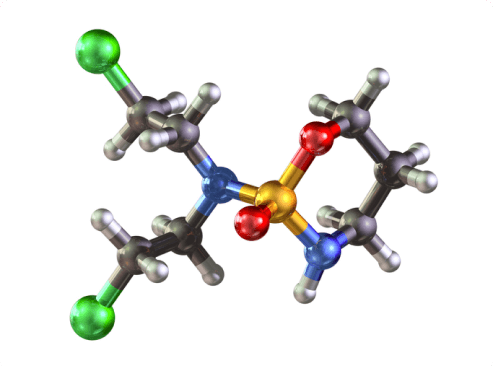Based on Your Reading:
Get a Mesothelioma Treatment Guide

Find a Top Mesothelioma Doctor

Access Help Paying for Treatment

Cyclophosphamide is a decades-old chemotherapy agent tried and tested for other cancers such as breast cancer, ovarian cancer and leukemia. For mesothelioma, however, it remains in the testing phases.

Written by Karen Selby, RN • Edited By Walter Pacheco • Medically Reviewed By Dr. Jeffrey Velotta
The Mesothelioma Center at Asbestos.com has provided patients and their loved ones the most updated and reliable information on mesothelioma and asbestos exposure since 2006.
Our team of Patient Advocates includes a medical doctor, a registered nurse, health services administrators, veterans, VA-accredited Claims Agents, an oncology patient navigator and hospice care expert. Their combined expertise means we help any mesothelioma patient or loved one through every step of their cancer journey.
More than 30 contributors, including mesothelioma doctors, survivors, health care professionals and other experts, have peer-reviewed our website and written unique research-driven articles to ensure you get the highest-quality medical and health information.
My family has only the highest compliment for the assistance and support that we received from The Mesothelioma Center. This is a staff of compassionate and knowledgeable individuals who respect what your family is experiencing and who go the extra mile to make an unfortunate diagnosis less stressful. Information and assistance were provided by The Mesothelioma Center at no cost to our family.LashawnMesothelioma patient’s daughter


Selby, K. (2024, February 2). Cyclophosphamide. Asbestos.com. Retrieved April 18, 2024, from https://www.asbestos.com/treatment/chemotherapy/cyclophosphamide/
Selby, Karen. "Cyclophosphamide." Asbestos.com, 2 Feb 2024, https://www.asbestos.com/treatment/chemotherapy/cyclophosphamide/.
Selby, Karen. "Cyclophosphamide." Asbestos.com. Last modified February 2, 2024. https://www.asbestos.com/treatment/chemotherapy/cyclophosphamide/.
Researchers have already proven the safety and efficacy of cyclophosphamide in other diseases. The U.S. Food and Drug Administration (FDA) approved it for use in several cancers and diseases, including breast cancer and leukemia. Doctors have seen mixed results in clinical trials but remain hopeful that the drug can be implemented successfully in mesothelioma treatment regimens.
Now, researchers are studying its effects in combination with other chemotherapy drugs and in combination with immunotherapy on mesothelioma patients.
| Name | Cytoxan |
| Related Drug | Ifosfamide |
| Manufacturer | Bristol-Myers Squibb |
| Dosage | 40-50 mg/kg over 2-5 days |
| Administration Route | Intravenous or oral |
| Active Ingredient | Cyclophosphamide |
| Drug Class | Antineoplastic alkylating agent |
| Medical Code | J9097, J8530 |
| Alternate Names | Lyophilized Cytoxan, Endoxan, Cytophosphane, Neosar, Procytox, Revimmune, Cycloblastin |
| Interacting Drug | Grapefruit, grapefruit juice, alcohol, live vaccines, carbamazepine, idarubicin, natalizumab, entanercept, palifermin, phenobarbital |
| Medical Studies | Tumor-Infiltrating Lymphocytes and Low-Dose Interleukin-2 Therapy Following Cyclophosphamide and Fludarabine in Patients with Pleural Mesothelioma |
| FDA Warning | Immune suppression, bone marrow toxicity, myelosuppression, kidney and urinary toxicity, heart toxicity, pulmonary toxicity, liver disease, secondary cancer, fetal toxicity, reproductive harm |
Get a Mesothelioma Treatment Guide

Find a Top Mesothelioma Doctor

Access Help Paying for Treatment

Unlike traditional chemotherapy drugs that must be administered intravenously, cyclophosphamide may also be administered in tablet form, once or twice daily. Mesothelioma patients in clinical trials usually receive the drug in the traditional intravenous manner, typically once every two weeks.

Cyclophosphamide is an alkylating agent, which means it is designed to inhibit tumor growth by interfering with the DNA of cancer cells. It can bind with DNA in mesothelioma cells. Once it does so, it prevents cell division and prompts the death of cancer cells.
In clinical trials, it is being studied in combination with other chemotherapy drugs or immunotherapy agents such as SS1P and certain vaccines.
Cyclophosphamide comes with the general side effects of chemotherapy, such as fatigue, weight loss, nausea and hair loss. It may cause additional side effects of abdominal pain, chest pain or shortness of breath, which usually are not severe.
However, doctors have noted one significant potential side effect: an increased risk of other types of cancer. Long-term use and high doses create the most risk. Bladder cancer is the most common resulting cancer, which may develop years after use. Acute leukemia is also associated with the use of cyclophosphamide.
Researchers have had mixed results when testing cyclophosphamide in mesothelioma patients.
One study had positive results when patients underwent radiation therapy followed by a chemotherapy regimen of cyclophosphamide and doxorubicin. Adding the chemotherapy regimen caused tumors to decrease in size by about 25%. Overall, patients who received radiation therapy and chemotherapy survived a median of 13 months, compared to only six months in patients who received radiotherapy alone. However, these results may be slightly skewed since chemotherapy was only given to those patients who were 70 or younger and responded well to initial radiation therapy.
A study from 2010 combined cyclophosphamide with doxorubicin and platinum-based chemotherapy. Success was measured by progression-free survival, which is the time that passes after treatment until the cancer spreads. In the three patients receiving this chemotherapy combination, median progression-free survival was only 1.5 months. This is significantly shorter than the median 12.3 months achieved by a regimen of pemetrexed and platinum-based chemotherapy.
A 2017 study combined cyclophosphamide with an immunotherapy approach called T-cell therapy in six pleural mesothelioma patients. Of the four patients evaluated at publication, one showed tumor shrinkage, another’s tumor stopped growing, and the other two did not respond (their cancer progressed).
In 2021, a research study involving cyclophosphamide with dendritic cell therapy showed promising results. The overall survival at two years for mesothelioma patients was 55.2% and over 20% of patients lived for 5 years or more.
Doctors see promise in cyclophosphamide for treating mesothelioma cancer, and clinical trials continue to test the drug on mesothelioma patients. Ongoing studies are testing the chemotherapy agent in conjunction with immunotherapy or other chemotherapy drugs to treat mesothelioma patients.
Your web browser is no longer supported by Microsoft. Update your browser for more security, speed and compatibility.
If you are looking for mesothelioma support, please contact our Patient Advocates at (855) 404-4592
